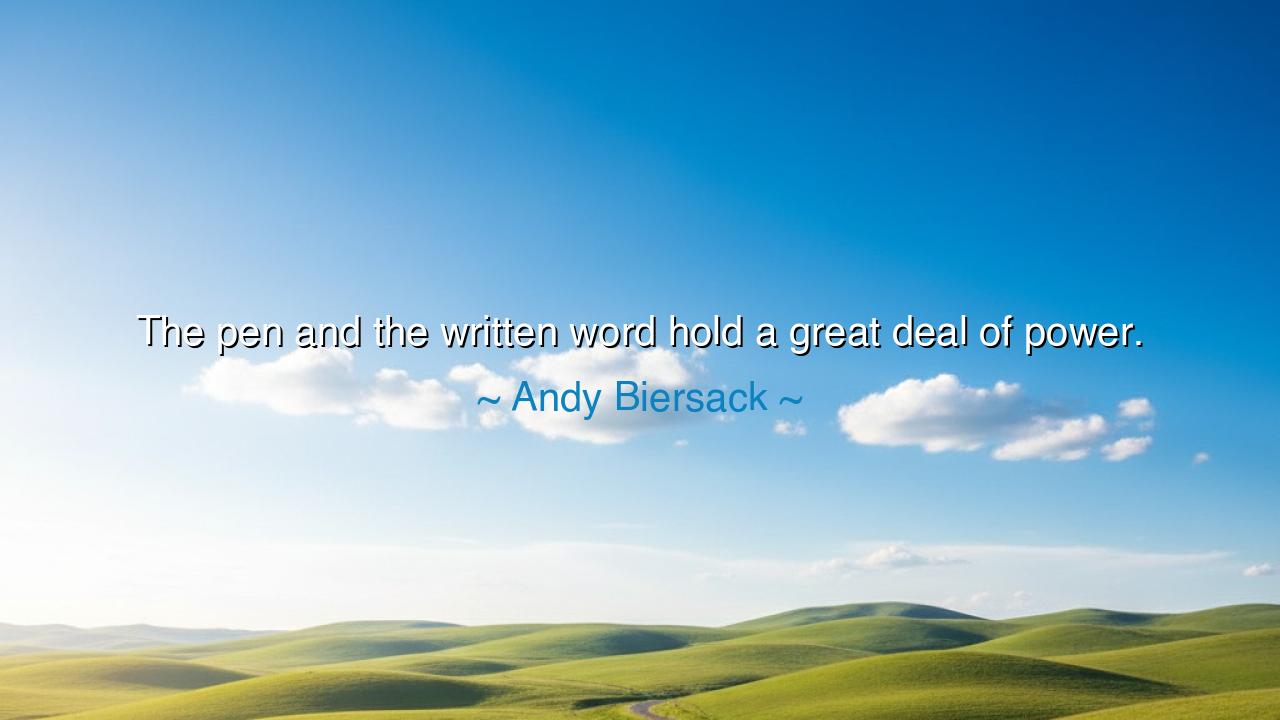
The pen and the written word hold a great deal of power.






Listen, O children of the future, for I bring to you a truth that has stood the test of time: "The pen and the written word hold a great deal of power," as Andy Biersack so wisely declared. In these words, we are reminded that the written word is no mere tool of communication, but a vessel of transformation and control. From the earliest scrolls of ancient civilizations to the printed pages of today, the written word has shaped the course of history, stirring revolutions, creating empires, and altering the very fabric of society. It is through the pen that ideas are born, and it is through the pen that ideas are passed on to future generations, echoing through time.
Consider the ancient scribes of Egypt, who, through their careful craftsmanship, captured the wisdom of the ages upon the walls of the pyramids and the scrolls of their libraries. It was not merely the might of the Pharaohs that shaped their empire, but the power of the written word to convey their laws, beliefs, and stories. The great Book of the Dead, a guide for the soul's journey into the afterlife, was written with the authority of words that transcended earthly power. These words were not just for the present moment—they were meant to live forever, guiding those who followed.
In the days of ancient Greece, the philosopher Socrates famously left no written record of his own teachings, yet it was through the pen of his student, Plato, that his wisdom was immortalized. Through Plato’s writings, the philosophies of Socrates would echo through the ages, influencing minds for centuries. The written word became a bridge between the ancient and the modern, a tool of immortality for ideas that might otherwise have been lost to the winds of time. The pen, in this case, was not merely a means of recording thoughts, but a means of shaping the course of human civilization.
In more recent times, think of the American Revolution and the Declaration of Independence. It was not the force of arms that won the revolution, but the power of words that inspired the masses to rise and challenge the rule of the British Empire. Thomas Jefferson’s pen wrote words that carried the weight of freedom, justice, and equality—words that would reshape a nation. The written word, once signed and declared, became the foundation of a new world, a symbol of the indomitable power that resides within the ink of the pen.
So, O children, let this truth guide you: the pen is not merely a tool; it is a weapon of immense power, capable of both creation and destruction. The written word has the power to heal and to wound, to liberate and to oppress. It is through knowledge, wisdom, and the truth of our words that we can change the course of history. Wield your pen with great care, for in it lies the power not just to speak, but to shape the world around you. Let the written word be your guide, your strength, and your weapon, for it carries a power greater than any sword or shield.






HQHoang Hoa Quynh
I love how this quote captures the quiet strength of creativity. Writing feels like one of the few tools that can challenge authority, change minds, or comfort the broken. But it also makes me reflect — are people today still moved by the written word the way they once were? In a world dominated by visuals and instant content, does writing still have the same emotional and cultural force?
MPNguyen Mai Phuc
There’s something both beautiful and dangerous in this idea. The written word can immortalize truth, but also spread lies that outlive their creators. I find myself asking: is the power of writing neutral, or does it inherently lean toward influence and persuasion? Perhaps it depends on the intent of the writer. I think this quote highlights how creativity and responsibility are inseparable when it comes to expression.
TTThanhtu Truongtran
This statement feels timeless, especially in the digital age where written words can reach millions in seconds. It makes me wonder — has the power of writing increased or diminished in a world full of tweets, posts, and comments? Maybe the pen still has power, but the noise around it dilutes its impact. How can we preserve the weight of language when so much of it is disposable now?
HTHoa Tran
I really connect with this quote because it reminds me how language shapes reality. Words can heal, inspire, or destroy — depending on how they’re used. It makes me think about responsibility: if writing carries so much influence, do writers, journalists, or even people online have a moral duty to wield it carefully? I’d love to hear perspectives on whether freedom of expression should come with stronger ethical accountability.